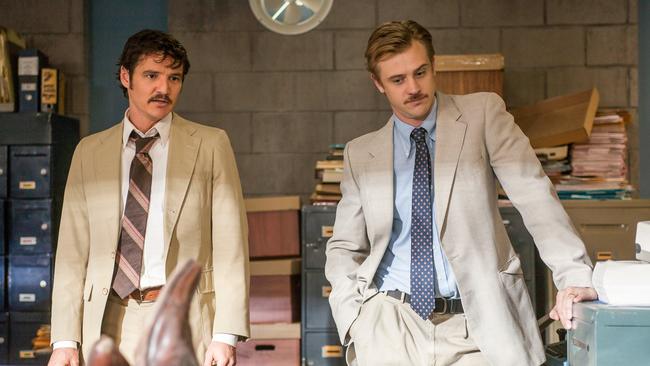Narcos: dispatches from the US war on drugs
Pick of the day: Narcos, streaming on Netflix.

Pick of the day: Narcos, streaming on Netflix.
This greatly anticipated original 10-part series has been around for about a year and is still trending on streaming service Netflix, for which it was produced as an early example of so-called “original” content.
It’s certainly that in spades. It has helped pave the way for a host of new shows but few have had the impact of this narco drama.
The title, Narcos, is the local term for drug dealers and the series chronicles the real-life stories of infamous drug kingpins of the late 1980s, led by Pablo Escobar, and their clashes with law enforcement agencies.
It’s full of action-movie fireworks, set-piece escapes and gunfights, along with a persuasive message: the drug policy pursued so vigorously by the US government during the past 30 years has not worked. Like David Simon’s The Wire, Narcos is a kind of serialised procedural, a “visual novel”, fundamentally concerned with the way the fatuously titled “war on drugs” (a term first used by US president Richard Nixon in 1971) remains an unmitigated disaster and how governments will never find a way to police desire and human frailty.
Brazilian actor Wagner Moura stars as Escobar; Pedro Pascal (Oberyn Martell from Game of Thrones) plays Javier Pena, one of the Drug Enforcement Administration agents tasked with bringing him to justice; and Boyd Holbrook (Hatfields & McCoys) is Steve Murphy, the agent who took the rooftop photographs.
They provide the other side of this intense cat-and-mouse narrative in the dual-language series — it’s 60 per cent in English and 40 per cent in Spanish with subtitles — and the US agents themselves have a problematic relationship with legality.
“If there’s one thing I’ve learned in the narco world it’s that life is more complicated than you think; good and bad are relative concepts,” Holbrook says. “In the world of drug dealers you do what you think is right and hope for the best.”




To join the conversation, please log in. Don't have an account? Register
Join the conversation, you are commenting as Logout